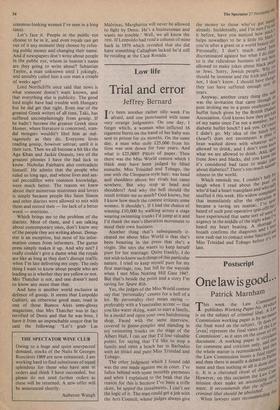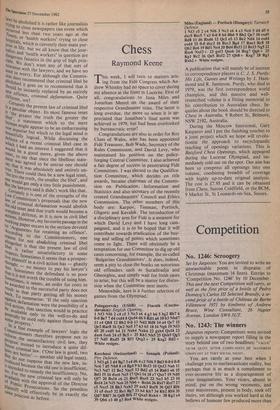Postscript
One law is good..'
Patrick Marnham
T. hpi us h swheeesk Working g Law Paper sCoo. M841noi is on the subject of criminal libel. A ';05 Commission working paper is by no Ine',.4 t_ e final word on the subject. t es not [even] represent the final views of the document.fhomcomment m i ss i Commission', nA' , and working rt kcriticismsian says gs op na paper rover oclou itabi iti."eee rind the whole matter is reconsidered, an%ort, the Law Commission issues a final 1:,,e„vdia- and then there is usually a debate in 1-'4ot m. ent and then nothing at all is done a'""c,, Hit.owItevi is However, ocherishedhth t this occasionritual the clLe arn: cca- mission does make an astonishing of ment. It recommends that the off criminal libel should be abolished.that When lawyers start recommending laws be abolished it is rather like journalists trying to close newspapers (an event which occurred less than two years ago at the Times), or 'health workers' trying to close
hospitals, which is currently their main
pur- Pose in life. but we all know that the ejour- nalists and 'health workers' in question are dangerous fanatics in the grip of high prin- ciPle. We don't want any of that sort of nonsense with the lawyers; and we have no need to worry. For although the Commis- sion does recommend that criminal libel be abolished it goes on to recommend that it should be instantly replaced by an entirely ew offence, criminal defamation. Quite different, see? Certainly the present law of criminal libel is a Peculiar object. Its most famous tenet
lib' greater the truth the greater the
d
ha statement which to the mere
'nlan might appear to be an embarrassing rti sequitur but which to the legal mind is neautifully logical. While discussing the defence of a recent criminal libel case in which I had an interest I suggested that it would be a good move, given the above tenet, to say that since the libellous state- Ment was agreed to be untrue one should aunt that it was absolutely and entirely un- true. There could then be a new legal tenet, the less the truth, the smaller the libel', and ono would get only tiny ttle punishment. gut the lawyers said a it didn'li t work like that. Certainly it is one of the strengths of the
"
Coromission's proposals that the new Ch °f criminal defamation would abolish e old tenet and that truth would become a complete i te defence, as it is now in civil libel
w ork s However, my favourite passage in the
t ng paper occurs in the section ec°r rg devoted Auments for retaining an offence'.
reason to the Commissioners, one
for not abolishing criminal libel l;,together is that the present law of civil ;eel is rather unsatisfactory in some tesPects. Sometimes it seems that a prospec- tive Plaintiff in a civil action has — ghastly fuNght — no money to pay his lawyer s ,,ees.. Sometimes the defendant is so poor sulat it is not worth the trouble of suing him. kcInletimes, it seems, an order for costs to r"; awarded to the successful party does not suit in that party getting all his money ",ac.k. To summarise: 'If the only sanction inst defamation were the possibility of a civil action that sanction would in practice „ availablesome only to the well-to-do and
bet)
rinerailY be used only against those having e property.' c a fine example of lawyers' logic the reTrinitssioners therefore propose not to 4°riu the unsatisfactory civil law, they i",_°Pose instead to introduce a quite dif- _rent criminal law. (`One law is good, two gut are better' — another old legal tenet). do not suppose that the new law, in- :sOduced because the old one is insufficient, ni °intended to remedy the insufficiency. No, ay.•°r the new criminal law only be wadable with the approval of help irector .1)11.blic Prosecutions. So the penniless saaintaf will effectively be in exactly the same Position as before.











































 Previous page
Previous page